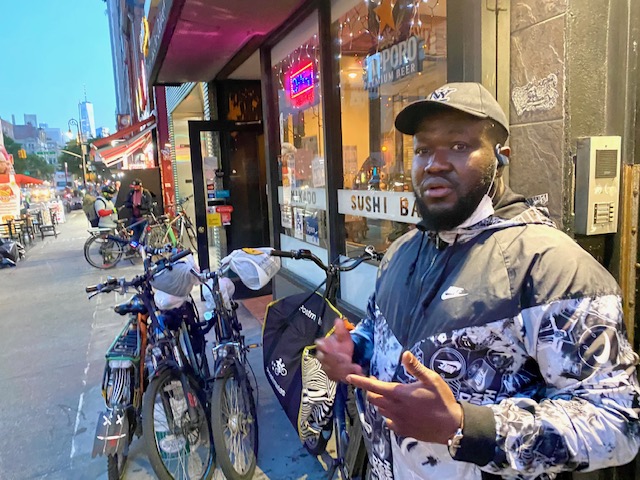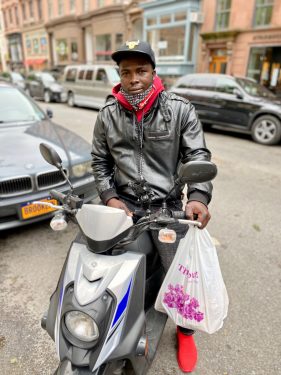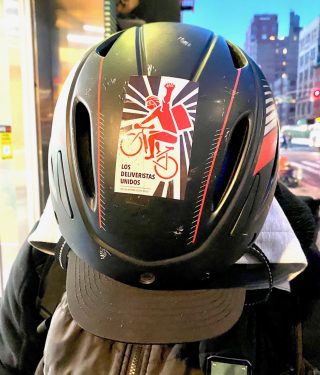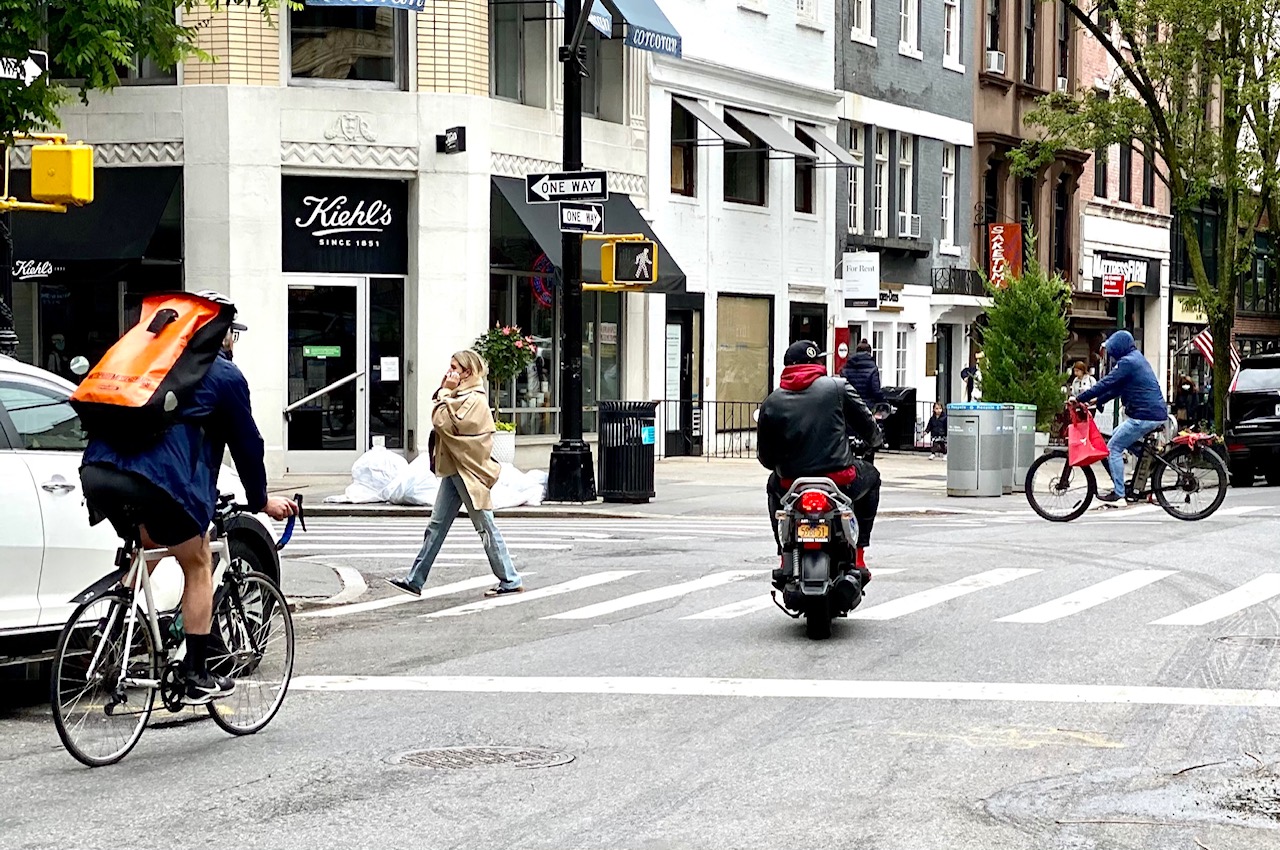
BROOKLYN HEIGHTS — Hundreds of thousands of New Yorkers enjoyed a day off on Memorial Day, but for food delivery man Michel Simpoe, it was just another day to earn another few dollars.
In case anyone who ever orders takeout delivery meals thinks his job is as easy as rolling up on a scooter or an electric bike, making a delivery, taking a tip, and riding back to an eatery to do it all again, Simpoe wishes they would think again.
He says life as a food delivery man is anything but easy. He can recite a litany of concerns: he might get into an accident on the way to or from a delivery; finish a long day’s work with meager take-home pay; have his expensive e-bike stolen if he leaves it unattended for too long; or not be able to use the restroom in the very restaurant where he’s working.
In addition, lack of access to a restroom all day “is a big problem for us right now,” Simpoe said. The native of the West African nation of Burkina Faso, who now lives in Brooklyn, has worked as a delivery man since 2017.
“The restaurant — they don’t let us get in,” said Fofie Agnini, another delivery worker who is also from West Africa, having immigrated from the Ivory Coast. “When it’s cold, we have to stay outside.”

Simpoe, who is Catholic, and Agnini, who is Muslim, are among an estimated 80,000 food deliverers in New York City who are not regular employees of the restaurants or the app-based services that dispatch them.
Most are immigrants, and as contract workers in a “gig-based” economy, they have no human resources department to hear and address their workplace concerns.
But the Brooklyn-based Workers Justice Project (WJP) believes they deserve a voice and aims to speak up for them on issues such as restroom access, road safety, and fair compensation for unusually long-distance deliveries.
Last year, WJP organized Los Deliveristas Unidos (The United Deliverers), a collective of independent delivery workers, to demand better labor conditions. WJP leaders said that during pandemic-related restrictions on indoor dining imposed last year, many restaurants remained financially afloat through takeout delivery income.
That also brought more business to app-based delivery-dispatch services, but WJP leaders claim some of them exploit the delivery workers by sending them on longer trips without commensurate pay.
WJP executive director Ligia Guallpa said delivery workers risk their lives navigating in heavy traffic on rain-or-snow-slick roads to bring food to thousands of New Yorkers.
She said these workers proved during the pandemic that they’re essential workers, and therefore deserve similar compensation and protection.
“Los Deliveristas Unidos are uniting and organizing to defend their existence, their rights, and to protect all delivery workers from exploitative practices,” Guallpa said.
WJP is a secular organization, but seeking justice for workers aligns with the Catechism of the Catholic Church mandates for the fair treatment of all workers which states: “A just wage is the legitimate fruit of work. To refuse or withhold it can be a grave injustice. Remuneration for work should guarantee a man the opportunity to provide a dignified livelihood for himself and his family.”
Ready for Anything
Simpoe shared his perspectives last week as he took a break outside a row of restaurants on Montague Street in Brooklyn Heights.
It was the last day of May, but still cool and overcast after heavy rain and drizzle the day before. Still, he and his fellow delivery workers showed up, clad in well-used raingear, ready for assignments.
“You have to be ready for anything,” said Simpoe, who studied accounting back home in Burkina Faso.
He said he hoped to continue his studies in the U.S., but for now, focuses on working to earn enough to pay his rent and bills. He does not belong to a specific parish, but he attends Mass as often as he can — for a very specific reason.
“I go to church and pray every time for strength,” he said. “This job is very physical.”
Agnini discussed his workplace concerns recently while waiting to take a delivery order from a sushi restaurant on Sixth Avenue in Manhattan.
He noted that some restaurants had eased the restroom-use restrictions imposed at the height of the pandemic; still, he fears, that policy could change soon as eateries resume regular seating. Some customers are upset when they see delivery riders inside, he said.
“But, that’s the restaurant,” Agnini said. “So you can’t say anything. It’s a private business.”
Another deliverer working nearby, Michael Rodriguez, said he was glad to hear Los Deliveristas Unidos was calling attention to the riders’ concerns. Previously, he said, they relied on each other for advice on how to navigate the gig-based industry.
Rodriguez confirmed that during the pandemic, deliverymen have been assigned longer trips, but some such runs have been for orders costing just a few dollars, not worth the time — or expense —it takes to trek across town.
“Guys were recommending that when we get orders that are $5 or less, just reject them,” Rodriguez said. “The app asks you why it’s being rejected. You can say the order is too small; it’s not worth it. So, I’ve been doing that. I’ve been doing a lot better now. I get higher orders.”
The spot on Sixth Avenue is just a few steps away from the intersection of 14th Street, where, in April, more than 3,000 delivery workers rode their bikes past in a procession, organized by Los Deliveristas Unidos, to protest for better working conditions.
‘Sometimes, You Don’t Have a Choice’
Just as big a concern, according to deliverymen, is bike theft. Most say thieves have taken their bikes as least once, and some have had it happen repeatedly. Simpoe, who was making his Memorial Day runs on a scooter, said he has lost three e-bikes to theft.
He said e-bike theft can be very organized, and often violent. He described how thieves will order takeout, wait for the deliverer to arrive, and then pounce — taking the bike and even beating its owner in the process.
Agnini said thieves stole his first bike, and the one after that, and a third one as well. He is now on his fourth e-bike in three years.
“A new one costs around $1,700 to $1,800,” he said. “If they take this one from you, they’re going to sell it for like $800. So for them, that $800 is a good business.”

Agnini added that many workers buy used e-bikes without asking how the seller got them because they concede that without wheels, they can’t work.
“Sometimes, you don’t have a choice,” Agnini said.
Fawwaz Uddin agreed. He is a delivery worker from Bangladesh who now lives in Park Slope, Brooklyn. He shared his experiences near the intersection of Seventh and Greenwich Avenues in lower Manhattan before riding home on the Manhattan Bridge.
“I had three bikes stolen,” Uddin said. “They cut the locks [and] just take it, and go. One bike was [worth] almost $2,000.”
Agnini and Uddin said they reported the thefts to police, but neither has heard of anyone’s bike being recovered that way.
The New York Police Department has stated that it’s hard to recover a stolen bike without documented proof of ownership and suggests registering a serial number through the NYPD’s “E-Bike and Bicycle Etching Program.”
“An etched e-bike/bicycle will assist NYPD in identifying it, in the event it is stolen,” police said in a news release.
Riders can visit their local police precincts to have bikes etched with a personal serial number at no cost and with no appointment necessary. The owner also receives a decal for the bike, identifying it as registered with NYPD.
“Removal of the decal leaves behind the word ‘void,’ which alerts police that the bicycle has been stolen,” according to the NYPD.
City Hall Responds
Agnini, Uddin, and Rodriguez all said they deliver for DoorDash and that working with the company has recently gotten easier. DoorDash officials said in a blog post in December that they take the complaints of their NYC “Dashers” seriously and are working to address them.
Meanwhile, a few days after the April protest through Manhattan, members of the New York City Council introduced legislation to start helping the workers. If they pass, the bills will address some of the problems they face.
Included were bills sponsored by Carlos Menchaca, representing Red Hook, Sunset Park, Greenwood Heights, parts of Windsor Terrace, parts of Dyker Heights, and Borough Park. Also sponsoring bills was Justin Brannan, representing Bay Ridge, Bensonhurst, parts of Dyker Heights, and Bath Beach in southwest Brooklyn.
Legislation co-sponsored by Menchaca would require restaurants “to provide toilet facility access to food delivery workers.” A bill co-sponsored by Menchaca and Brannan would allow deliverers to “set limitations on distance and routes for deliveries.”
Still another bill co-sponsored by Menchaca would prevent app companies from charging workers fees for depositing their earnings in options that are not traditional bank accounts.
Also, Brannan co-sponsored a bill requiring companies to provide insulated food bags instead of making workers buy them.
He says the legislation is aimed to “level the playing field for these essential workers.”
“Delivery workers are among the least protected workers in NYC,” he said in a tweet. “Yet we rely on their labor all the time. They deserve dignity, reliability, and fairness.”

